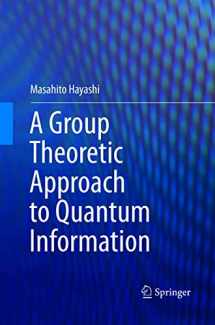
A Group Theoretic Approach to Quantum Information
Book details
Summary
Description
Review “This text is one of the few resources available at this time that merge group theory and quantum information. …This text could be used, for example, by graduate students with some background in both group theory and quantum information theory wishing to do some independent study or faculty wishing to expand their toolkit.” (Sarah Plosker, Mathematical Reviews, September, 2017)“The present book deepens the role of symmetry in quantum computing and quantum information, and paves the way for all researchers, including students and PhD students, to apply group-theoretical methods in these areas. This is a sort of recommendation.” (Eugene Kryachko, zbMATH 1362.81003, 2017) Product Description This book is the first one addressing quantum information from the viewpoint of group symmetry. Quantum systems have a group symmetrical structure. This structure enables to handle systematically quantum information processing. However, there is no other textbook focusing on group symmetry for quantum information although there exist many textbooks for group representation. After the mathematical preparation of quantum information, this book discusses quantum entanglement and its quantification by using group symmetry. Group symmetry drastically simplifies the calculation of several entanglement measures although their calculations are usually very difficult to handle. This book treats optimal information processes including quantum state estimation, quantum state cloning, estimation of group action and quantum channel etc. Usually it is very difficult to derive the optimal quantum information processes without asymptotic setting of these topics. However, group symmetry allows to derive these optimal solutions without assuming the asymptotic setting. Next, this book addresses the quantum error correcting code with the symmetric structure of Weyl-Heisenberg groups. This structure leads to understand the quantum error correcting code systematically. Finally, this book focuses on the quantum universal information protocols by using the group SU(d). This topic can be regarded as a quantum version of the Csiszar-Korner's universal coding theory with the type method. The required mathematical knowledge about group representation is summarized in the companion book, Group Representation for Quantum Theory. From the Back Cover This textbook is the first one addressing quantum information from the viewpoint of group symmetry. Quantum systems have a group symmetrical structure. This structure enables to handle systematically quantum information processing. However, there is no other textbook focusing on group symmetry for quantum information although there exist many textbooks for group representation. After the mathematical preparation of quantum information, this book discusses quantum entanglement and its quantification by using group symmetry. Group symmetry drastically simplifies the calculation of several entanglement measures although their calculations are usually very difficult to handle. This book treats optimal information processes including quantum state estimation, quantum state cloning, estimation of group action and quantum channel etc. Usually it is very difficult to derive the optimal quantum information processes without asymptotic setting of these topics. However, group symmetry allows to derive these optimal solutions without assuming the asymptotic setting. Next, this book addresses the quantum error correcting code with the symmetric structure of Weyl-Heisenberg groups. This structure leads to understand the quantum error correcting code systematically. Finally, this book focuses on the quantum universal information protocols by using the group SU(d). This topic can be regarded as a quantum version of the Csiszar-Korner's universal coding theory with the type method. The required mathematical knowledge about group representation is summarized in the companion book, Group Representation for Quantum


We would LOVE it if you could help us and other readers by reviewing the book
Book review



